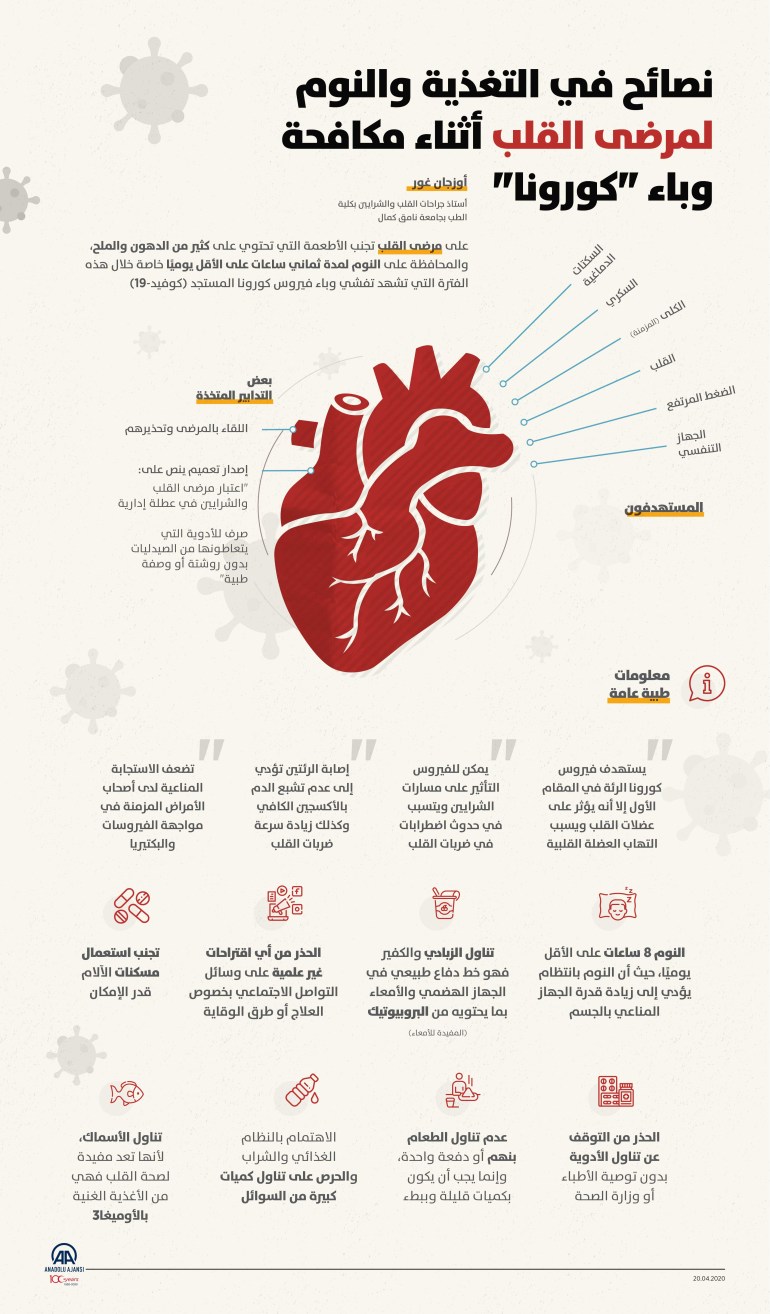Millions of people worldwide suffer from heart failure, a condition that may not be easily diagnosed because its symptoms may be associated with other diseases and aging.
What are the causes of heart failure?
And what are its symptoms that should not be overlooked at all?
In a report published by the French newspaper "Le Figaro", writer Cecile Tiber quotes Professor Nicolas Lamplan, Head of the Emergency and Intensive Care Department of Cardiology at Lille University Hospital, as saying that "heart failure is not a disease, but rather a dysfunction."
And Lamplan explains that heart failure “applies to all cases in which the heart muscle is unable to perform its role as a pump, and thus supply the body with blood and nutrients well.”
This health condition may turn into a chronic problem and the risks may be exacerbated.
What are the reasons?
Heart failure is a complication of heart or respiratory disease, and there are a range of reasons that may prevent the heart from distributing blood efficiently, including arrhythmia, disease of the heart muscle (cardiomyopathy) or valves, coronary artery disease, damage from heart attacks, and heart injury. virus, and alcohol abuse.
Narrowing or blockages in the peripheral arteries, diabetes, or high blood pressure may limit blood flow, making the heart pump more forcefully.
When does heart failure occur?
Regardless of the causes, heart failure in all cases develops according to the same pattern.
At first, the body tries to compensate by asking the heart to contract more forcefully and more frequently in order to maintain blood flow at normal levels, but this affects the peripheral circulation and the kidneys;
With the extra effort to pump blood, the heart builds more muscle which can cause the walls of the ventricles to thicken to be able to hold more blood with each contraction.
But these mechanisms cannot continue normally for long, and over time cause the heart muscle to weaken.
After a few months, the heart is exhausted from the extra effort, and this leads directly to heart failure.
Gradually, the muscles lose their strength and ability to contract properly, and the heart is no longer able to provide the body with the oxygen and nutrients it needs, and this condition is precisely heart failure.
Failure can occur on one side of the heart, i.e. left or right ventricular failure, and it may affect the entire organ, which is known as global heart failure.
Symptoms of heart failure
1- Shortness of breath
There are 4 main symptoms of this syndrome, most notably shortness of breath.
“When we feel short of breath when getting dressed or going upstairs, it means that the problem has been around for months or even years, but the worrying thing is that shortness of breath is a symptom that not many people realize its severity,” says Lamplan. In fact, many patients do not tell their doctors about this condition, and if they do, the answer may be that "it is normal, or they are overweight or age is the cause".
In the early stages of heart failure, shortness of breath occurs after moderate exertion (ascending 3 floors, for example), and then occurs even at rest.
"There is often a delay in diagnosis because many people never exercise, they cannot notice early symptoms of heart failure. Hence the importance of regular physical activity," Lamplan adds.
2- Weight gain
The second symptom of heart failure is rapid weight gain. "Because of water retention, a patient can gain 3 kilograms in 3 days, so it is a caution to bear in mind," explains Professor Lamplan.
3- Fatigue
Feeling tired is a worrying symptom. "What you feel at the end of the day when you come home from work is not exhaustion. Fatigue is the condition where you are unable to make any effort," says Lamplan.
4- Edema of the lower extremities
This means fluid pooling in the lower extremities, and swelling of the ankles and feet.
“When the heart is malfunctioning, the kidneys don’t get enough blood, and they make up for that deficiency by reabsorbing water and salt,” Lamplan explains. Swelling of the liver can cause pain under the right ribs.
These symptoms do not necessarily mean that you have heart failure, but they do indicate that there is a problem that needs to be diagnosed in time.
Diagnosis of heart failure
A simple blood test is enough to diagnose heart failure. “When there is pain, we measure the dose of a hormone secreted by the heart in the blood, called brain natriuretic peptide (BNP). When it is found in large quantities, this indicates a problem, It is a very reliable brand that has been in use for 20 years."
If the examination shows the presence of this hormone at high levels, an ultrasound examination of the heart should be performed, and this examination does not require pricks or x-rays, and allows to identify the source of the defect in heart function and the extent of the development of the condition.

